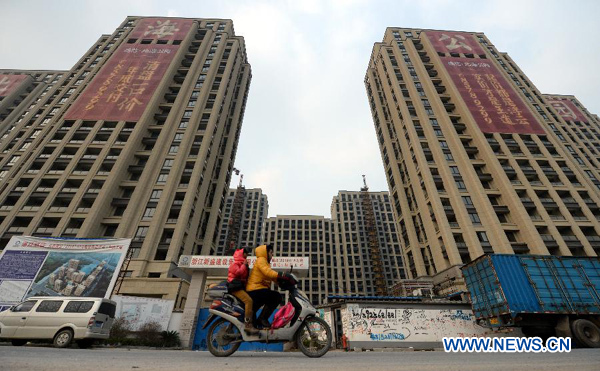
??Xinhua File Photo
BEIJING -- China's red-hot property market has been showing signs of cooling down, with some new housing projects cutting prices.
Cuts were reported in the cities of Beijing, Hangzhou and Shenzhen, where property sales have been strong.
A new real estate project in suburban Beijing priced its apartments lower than the market estimate by 12 percent or about 3,000 yuan (490.2 U.S. dollars) per square meter to 21,000 yuan in mid-March.
A project in Xiaoshan district in Hangzhou, capital of east China's Zhejiang Province, lowered the price of its apartments by 17 percent or about 2,500 yuan per square meter to about 12,500 yuan.
The cooldown has been supported by official data.
Home prices in major Chinese cities grew at a slower pace in February. Fewer cities saw month-on-month price rises, according to the National Bureau of Statistics (NBS).
A sales manager with a property company, on condition of anonymity, told Xinhua that developers were cautious in talking about "price cuts". Instead, they are using tricks like giving free interior renovation, free household appliances or a free down payment to woo buyers.
Despite cooling down signs, industry experts warned against exaggerating the trend.
Some property developers may cut prices to sell quick and get liquidity. But that does not mean overall property prices will go down, said Gu Yunchang, an official at the Ministry of Housing and Urban-Rural Development.
The property market is becoming rational and price changes, triggered by market demand, are normal, said Zhu Zhongyi, deputy head of the China Real Estate Industry Association.
The price of housing has been rising rapidly since 2003. It rose from 2,197 yuan per square meter in 2003 to 5,850 yuan per square meter in 2013, with an annual increase of 10.3 percent, according to Wind Information Co., Ltd., a Shanghai-based financial data provider.
Ren Xingzhou, a researcher in the market economy division of the Development Research Center of the State Council, warned against blind stimuli policies to prevent future declines in real estate investment.
NBS data showed the growth rate of investment in property development was 19.8 percent in 2013, compared to only 11.41 percent in 2012, Ren said.
Despite this, Ren has forecasted real estate investment to go down due to slow growth in land supply.
The decline of investment growth in real estate will inevitably slow down the growth of investment in fixed assets, thereby weakening the driving forces of China's economic expansion and causing pressure on local finance, taxation and employment, Ren said.
But China should not stimulate the real estate market by relaxing credit, land and taxes. If such policies were blindly adopted, serious overcapacity would occur in the real estate sector, he said.
Since 1998 when housing reform began in China, the sector has become more market-oriented, with rapid growth in residence investment and housing supply.
Investment in urban residences rose from 431.1 billion yuan in 1998 to 5.9 trillion yuan in 2013, with annual growth of 19 percent, according to Wind Information Co., Ltd..
Urban residents have enjoyed an increase in per capita housing area from 18.7 square meters in 1998 to 32.9 square meters in 2012, according to the data provider.